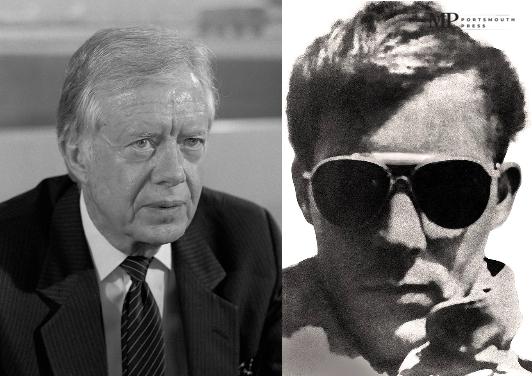In a poignant reflection, Hunter S. Thompson’s observations of former President Jimmy Carter’s speeches and political actions resonate with echoes of a past that still shape American politics today. As we look back at Carter’s career amidst the recent news of his passing at the age of 100, Thompson’s unique insights help stitch together a narrative that intertwines the worlds of journalism and political leadership.
51 Years Ago: A Groundbreaking Political Commentary
The year 1972 marked a significant milestone as Hunter S. Thompson published *Fear and Loathing on the Campaign Trail ’72*, setting a bar for political reporting that persists today. This work has often been referred to as a ‘bible of political reporting,’ as it depicted the political landscape between candidates George McGovern and Richard Nixon with stark honesty and vivid commentary. In it, Thompson laid bare what he termed the ‘shameless lies and cynical bullshit’ prevalent in American politics.
Thompson’s Encounter with Carter: A Memorable Moment
In May 1974, Thompson attended Law Day at the University of Georgia. It was here that he had a firsthand view of Jimmy Carter’s powerful address that criticized the criminal justice system and resonated deeply with the audience. Thompson later expressed that Carter’s words not only stirred the public but reflected a deeper societal concern, further enlivened by Carter’s mention of Bob Dylan’s music as a source of inspiration for his social justice views.
Carter at the Crossroads: A Look at His Legacy
Jimmy Carter’s presidency (from 1976 to 1981) was riddled with challenges such as the energy crisis and the Iran hostage situation. Yet, years after leaving office, Carter’s impact significantly endured through humanitarian efforts, including his work with the Carter Center and Habitat for Humanity. His legacy is characterized not just by his presidency but by his humanitarian efforts, which won him the Nobel Peace Prize in 2002, an honor that solidified his influence globally.
Turning Points in American Politics
The 1972 election, which Thompson so vividly covered, became a turning point in American politics. It was a time when celebrity endorsements began to play a crucial role in political campaigns, as candidates recognized the need for youthful appeal. McGovern’s campaign was among the first to lean into this new strategy, yet, ultimately, the failure to connect with core values of the largest swath of American voters saw him lose to Nixon. Thompson’s analysis posed poignant questions about the effectiveness of media strategies versus the authentic connection with people’s hopes and concerns.
Reflections on the Legacy of Two Icons
Both Carter and Thompson, though different in their fields, shared a vision of integrity, truthfulness, and a desire to challenge prevailing norms. Carter’s speeches often implored for social justice and accountability, ideals that Thompson echoed through his Gonzo journalism. Thompson once described Carter as possessing a ‘mean streak,’ a critical recognition of Carter’s complexities that further deepened the narrative around both figures.
A Sobering Lasting Impact
As we mourn the passing of Jimmy Carter, it’s vital to recognize how Thompson’s insights and perspectives contributed significantly to understanding the layered fabric of American political life. Each moment captured in Thompson’s works offers a poignant reminder of the ongoing dialogue between politics and journalism, illuminating how they intersect and evolve. The influence of these cultural icons reminds us of their enduring importance in reflecting and shaping the narrative of American ideals.
| Hunter S. Thompson’s Key Works | Years |
|---|---|
| *Fear and Loathing on the Campaign Trail ’72* | 1972 |
| Signature journalistic insights | Throughout career |









